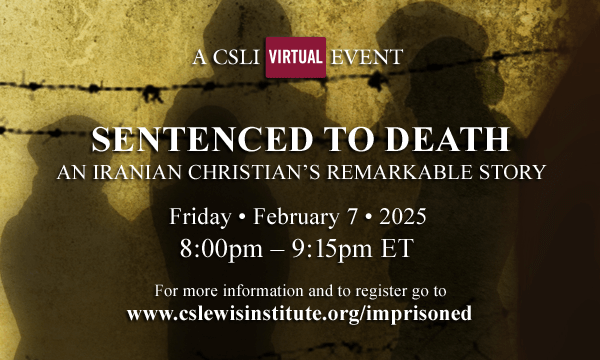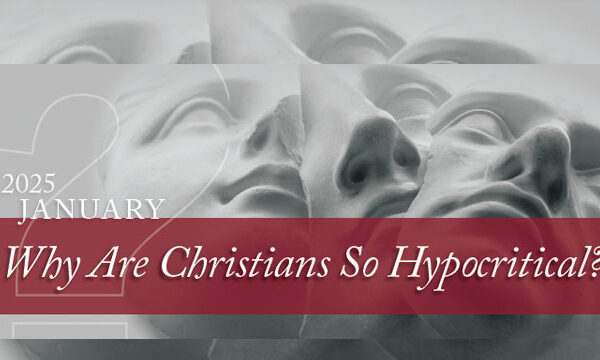Back to series


Christ and the Bible
Click here to open a Print - Friendly PDF
We live in a time of growing secularism. The separation between the sacred and secular, the ecclesiastical and political, is growing. The accent of living is on the present. Life is to be lived according to the present pressure without a view towards ultimate meaning and significance. Within the church, membership is down in all the major denominations. At the same time, there is growing membership in cult and occult groups. The central doctrines of the gospel are questioned not only from outside the church but from inside. Unless there is an authoritative standard by which we can give clear answers to the above problems, we are caught in the same relativism and flux as the culture.
Sartre once said that no finite point has any meaning unless it has an infinite reference point. In his Tractatus Logico Philosophicus, Wittgenstein argues that the sense of the world must lie outside the world, that man never has sufficient perspective from within this world to build an eternal structure of truth and value. If there is any value that does have value, it must lie outside of the whole sphere of what happens now. In other words, ethics are transcendental. In a lecture (published in the Philosophical Review, January 1965), Wittgenstein said that if a man could write a book of ethics which really was a book of ethics, this book would, with an explosion, destroy all other books in the world.
Neither Sartre nor Wittgenstein seriously considered the Scriptures as the answer to the need for that reference point. Unless we do have that reference point in Scripture, we are bound to be uncertain about the message we have to proclaim.
There has been a widespread retreat from the absolute authority of Scripture even in conservative circles. Probably the most important factor is the massive assault of secular science and negative biblical criticism. Nearly the entire biblical framework of history and doctrine has been repudiated by a substantial segment of modern culture—including some of the theological sectors. Some feel that the inerrancy of Scripture cannot survive the scrutiny of critical study.
There are three basic ways to deal with the allegation that there are errors in the Bible. First, one can try to solve the problems uncovered by critical study. Second, one can hunt for a way to do theology without a reliable Bible. But when the authority of Scripture is surrendered, it is far from clear on what ground Christian truth can be predicated, because the tendency has been to appeal to biblical patterns and themes to illuminate the views put forward. The third alternative has been to limit inerrancy so that it is unaffected by certain kinds of errors.
Both liberals and conservatives have failed to be sufficiently critical of the critical theories. Obviously a full discussion is not possible here, but there is an approach to the problems that does show what is at stake, which is a consideration of Christ’s view of the Bible.
A number of significant liberal scholars have concluded that Jesus held an extremely high view of biblical authority. Kenneth Kantzer writes:
H.J. Cadbury, Harvard professor and one of the more extreme New Testament critics of the last generation, once declared that he was far more sure as a mere historical fact that Jesus held to the common Jewish view of an infallible Bible than that Jesus believed in His own Messiahship. Adolph Harnak, greatest church historian of modern times, insists that Christ was one with his apostles, the Jews and the entire early church, in complete commitment to the infallible authority of the Bible. John Knox, author of what is perhaps the most highly regarded recent life of Christ, states that there can be no question that this view was taught by our Lord Himself.
 Quotes from critics Bultmann and F.C. Grant could be added to the same effect. R.T. France in his excellent study, Jesus and the Old Testament, lists 164 references (not including parallels) in the synoptic gospels that need to be examined in determining Jesus’ view of Scripture. If the Gospel of John were included, the number would be nearly 200.
Quotes from critics Bultmann and F.C. Grant could be added to the same effect. R.T. France in his excellent study, Jesus and the Old Testament, lists 164 references (not including parallels) in the synoptic gospels that need to be examined in determining Jesus’ view of Scripture. If the Gospel of John were included, the number would be nearly 200.
Christ refers to Abel, Noah, Abraham, Sodom, and Gomorrah, Lot, Isaac, and Jacob and David eating showbread. It seems that he accepted the entire historical fabric of the Old Testament including those stories that are most troublesome to modern minds. In his various debates with religious leaders he never criticized them for following the Old Testament too carefully. He criticized them sharply for exalting their tradition above Scripture and for not reading it profoundly enough (Matt. 23:23; Mk. 7:1-13; Matt. 19:16-22; Matt. 22:29). Jesus also complied with relatively minor matters of the Law, for example, in making a leper show himself to the priest (Mk. 18:16) and in the payment of the temple tax (Matt. 17:24).
In the temptation narratives, Jesus says man is to live not by bread alone but by every word that proceeds from the mouth of God. In Matthew 5:17 he states that he did not come to abolish the Law and the Prophets, but to fulfill them; not one jot or tittle will pass away. Whoever relaxes the least of the commandments and teaches others to do the same will be least in the kingdom, and whoever does and teaches the least of the commandments will be great in the kingdom.
In John 10:31-39 Jesus calls the Scripture Law even though the passage is from Psalm 82:6—no doubt because all Scripture possesses legal force. He inserts the phrase “Scripture cannot be broken.” Its significance is not just as an isolated proof text, but as an indication of Jesus’ normal trust in Scripture.
One recurring objection to this line of approach is that Jesus accommodated his views to those of his contemporaries without committing Himself to the correctness of their position. There are two basic objections to this. First, Jesus was no conformist in theology. He was not afraid of conflict. Secondly, His doctrine of Scripture was too close to his own self-understanding to be assumed.
Clark Pinnock says,
Our Lord’s view of inspiration was not an isolated tenet of the border of his theology. His belief in the truthfulness of the Old Testament was the rock on which he based his own sense of vocation and the validity of much of his teachings.
Tasker writes:
Indeed, if he could be mistaken here on matters which he regarded as of the strictest relevance to his own person and ministry, it is difficult to see exactly how or why he either can or should be trusted anywhere else.
If Christ did hold such a high view of Scripture, then this might provide a clue as to how we are to approach our biblical difficulties. Should we not at least give the passage the benefit of the doubt? Should we start inductively with the difficulties and allow them to determine our view of Scripture, or should we start with Christ’s view of Scripture and view our difficulties in light of that?
At stake in the debate on the authority of Scripture is the authority of Christ Himself. Either we have a divine Christ and an infallible Bible, or a fallible Bible and no divine Christ.

Arthur W. Lindsley
Senior Fellow for Apologetics, CSLIArthur W. Lindsley is the Vice President of Theological Initiatives at the Institute for Faith, Works, & Economics. He has served at the C.S. Lewis Institute since 1987 both as President until 1998 and currently as Senior Fellows for Apologetics. Formerly, he was director of Educational Ministries at the Ligonier Valley Study Center, and Staff Specialist with the Coalition for Christian Outreach. He is the author of C.S. Lewis's Case for Christ, True Truth, Love: The Ultimate Apologetic, and co-author with R.C. Sproul and John Gerstner of Classical Apologetics, and has written numerous articles on theology, apologetics, C.S. Lewis, and the lives and works of many other authors and teachers. Art earned his M.Div. from Pittsburgh Theological Seminary and a Ph.D. in Religious Studies from the University of Pittsburgh.
 COPYRIGHT: This publication is published by C.S. Lewis Institute; 8001 Braddock Road, Suite 301; Springfield, VA 22151. Portions of the publication may be reproduced for noncommercial, local church or ministry use without prior permission. Electronic copies of the PDF files may be duplicated and transmitted via e-mail for personal and church use. Articles may not be modified without prior written permission of the Institute. For questions, contact the Institute: 703.914.5602 or email us.
COPYRIGHT: This publication is published by C.S. Lewis Institute; 8001 Braddock Road, Suite 301; Springfield, VA 22151. Portions of the publication may be reproduced for noncommercial, local church or ministry use without prior permission. Electronic copies of the PDF files may be duplicated and transmitted via e-mail for personal and church use. Articles may not be modified without prior written permission of the Institute. For questions, contact the Institute: 703.914.5602 or email us.
-
Recent Podcasts
From Anti-Christian to Pastor – Brian Smith’s Story
by Jana Harmon, Brian Smith on January 17, 2025Brian grew up in a small Georgia town...Read More
-
Time With God
by Aimee Riegert, J.I. Packer on January 10, 2025
-
Faith and Reason – Henare Whaanga’s Story
by Henare Whaanga, Jana Harmon on January 3, 2025
-
Recent Publications
Why Are Christians So Hypocritical?
by Christopher L. Reese on January 1, 2025Oh, the hypocrisy of those Christians—they talk so...Read More
-
How Artists and Their Art Can Point Us to the Creator
by Russ Ramsey on December 2, 2024
-
What about Jesus’s Childhood?
by Jim Phillips on December 1, 2024
0
All Booked
0.00
All Booked
0.00
All Booked
23931
GLOBAL EVENT: Sentenced to Death with Maryam Rostampour-Keller, 8:00PM ET
https://www.cslewisinstitute.org/?event=global-event-sentenced-to-death-with-maryam-rostampour-keller-800pm-et&event_date=2025-02-07®=1
https://www.paypal.com/cgi-bin/webscr
2025-02-07

Next coming event
Days
Hours
Minutes
Seconds
GLOBAL EVENT: Sentenced to Death with Maryam Rostampour-Keller, 8:00PM ET
On February 7, 2025 at 8:00 pmCategories
Speakers

Arthur W. Lindsley
Senior Fellow for Apologetics, CSLI
Team Members

Arthur W. Lindsley
Senior Fellow for Apologetics, CSLIArthur W. Lindsley is the Vice President of Theological Initiatives at the Institute for Faith, Works, & Economics. He has served at the C.S. Lewis Institute since 1987 both as President until 1998 and currently as Senior Fellows for Apologetics. Formerly, he was director of Educational Ministries at the Ligonier Valley Study Center, and Staff Specialist with the Coalition for Christian Outreach. He is the author of C.S. Lewis's Case for Christ, True Truth, Love: The Ultimate Apologetic, and co-author with R.C. Sproul and John Gerstner of Classical Apologetics, and has written numerous articles on theology, apologetics, C.S. Lewis, and the lives and works of many other authors and teachers. Art earned his M.Div. from Pittsburgh Theological Seminary and a Ph.D. in Religious Studies from the University of Pittsburgh.




